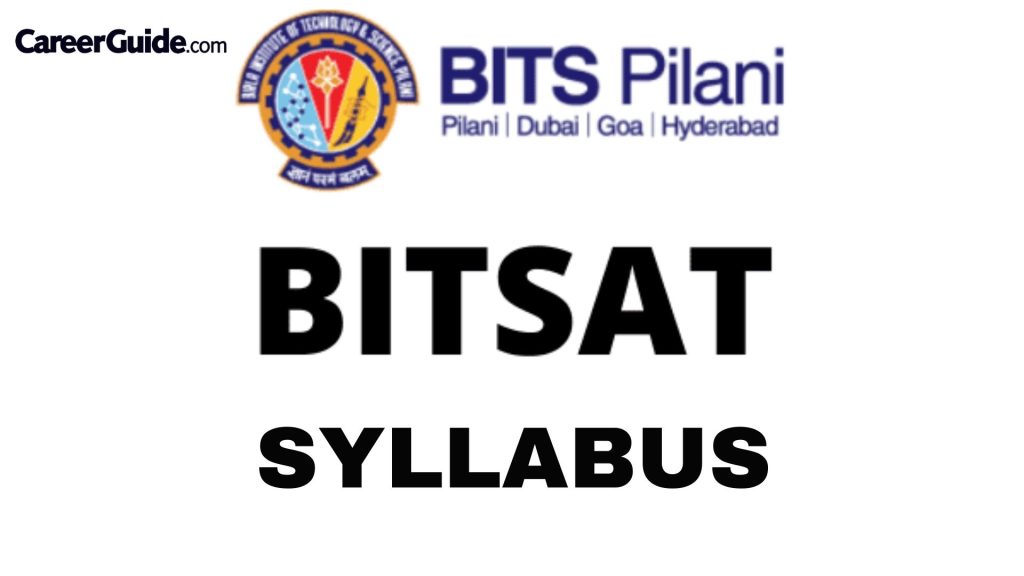BITSAT is a computer-based entrance exam conducted annually by the Birla Institute of Technology and Science (BITS) for admission to undergraduate engineering courses at its three campuses located in Pilani, Goa, and Hyderabad. The exam consists of multiple-choice questions from Physics, Chemistry, Mathematics/Biology, English Proficiency and Logical Reasoning. BITSAT is a highly competitive exam, and the difficulty level is considered to be moderate to difficult. The exam duration is three hours, and there is a negative marking of 1 mark for each incorrect answer. The exam is conducted in multiple sessions, and candidates can attempt the exam multiple times to improve their scores.
BITSAT 2023 Highlights
Section | Topics Covered | Level of Difficulty |
|---|---|---|
| Mathematics | 11 | Moderate to Difficult |
| Biology | 10 chapters from Class 11 and 12 CBSE syllabus | Moderate |
| Chemistry | 13 major topics, with most questions from chemical bonding and molecular structure followed by equilibrium and hydrocarbons | Moderate |
| Physics | 18 topics, with most questions from Current Electricity, Semi-Conductors, and laws of motion | Difficult |
| English & Logical Reasoning | English Proficiency (15 questions) and Logical Reasoning (10 questions) | Moderate |
The Mathematics section of the BITSAT exam covers 11 topics and is considered to be moderate to difficult in terms of difficulty level.
The Biology section of the exam covers 10 chapters from the CBSE syllabus of both Class 11 and 12. The topics from Class 11 hold more weightage than those of Class 12, with the maximum questions coming from principles of inheritance and variation, followed by molecular basis of inheritance and morphology of flowering plants.
The Chemistry section of the BITSAT exam consists of 13 major topics, with most of the questions coming from chemical bonding and molecular structure, followed by equilibrium and hydrocarbons.
The Physics section of the exam comprises 18 topics and is considered to be one of the toughest thresholds by many aspirants. Most of the questions are asked from Current Electricity, Semi-Conductors, and laws of motion.
The English & Logical Reasoning section of the exam is subdivided into two more sections: English Proficiency and Logical Reasoning. This section consists of 15 questions from English Proficiency and 10 questions from Logical Reasoning.

BITSAT 2023 Syllabus
Section | Topics |
|---|---|
| Physics | Units & Measurement, Kinematics, Newton’s Laws of Motion, Impulse and Momentum, Work and Energy, Rotational Motion, Gravitation, Mechanics of Solids and Fluids, Oscillations, Waves, Electrostatics, Current Electricity, Magnetic Effect of Current, Electromagnetic Induction, Optics, Modern Physics, Electronic Devices |
| Chemistry | States of Matter, Atomic Structure, Chemical Bonding & Molecular Structure, Thermodynamics, Physical and Chemical Equilibria, Electrochemistry, Chemical Kinetics, Surface Chemistry, Hydrogen and s-block elements, p- d- and f-block elements, Principles of Organic Chemistry and Hydrocarbons, Stereochemistry, Organic Compounds with Functional Groups Containing Oxygen and Nitrogen, Biological, Industrial and Environmental Chemistry |
| Mathematics | Algebra, Trigonometry, Two-dimensional Coordinate Geometry, Three-dimensional Coordinate Geometry, Differential calculus, Integral calculus, Ordinary Differential Equations, Probability, Vectors, Statistics, Linear Programming, Mathematical modelling |
| English Proficiency & Logical Reasoning | Grammar, Vocabulary, Reading Comprehension, Composition, Verbal Reasoning, Nonverbal Reasoning |
BITSAT 2023 Exam Pattern
Section |
Number of Questions |
|---|---|
| Physics | 40 |
| Chemistry | 40 |
| Mathematics/Biology | 45 |
| English Proficiency & Logical Reasoning | 25 |
Best Books for BITSAT 2023 Preparation
Here are some of the best books for BITSAT 2023 preparation:
Subject | Books |
|---|---|
| Physics | Concept of Physics by H.C Verma, Problems in General Physics by I.E. Irodov, NCERT Physics textbooks (class 11th and 12th) |
| Chemistry | NCERT Chemistry textbooks (class 11th and 12th), Organic Chemistry by Morrison and Boyd, Concise Inorganic Chemistry by J.D. Lee, Physical Chemistry by P.W. Atkins |
| Mathematics | NCERT Mathematics textbooks (class 11th and 12th), Objective Mathematics by R.D. Sharma, Mathematics for BITSAT by Arihant Publications |
| Biology | NCERT Biology textbooks (class 11th and 12th), Biology Vol. 1 and Vol. 2 by Trueman, Objective Biology by Dinesh |
Note: Apart from these books, candidates can also solve previous years’ BITSAT papers and sample papers to get an idea of the exam pattern and level of difficulty.
BITSAT Syllabus 2023 FAQs
The BITSAT 2023 syllabus includes topics from Physics, Chemistry, Mathematics/Biology, English Proficiency and Logical Reasoning. Candidates can refer to the official BITSAT 2023 brochure for the detailed syllabus.
The BITSAT syllabus covers most of the topics that are included in the JEE Main syllabus. However, there are some additional topics in BITSAT syllabus, and the level of difficulty of the questions may vary.
NCERT textbooks are a good source for building a strong foundation in the concepts covered in the BITSAT syllabus. However, candidates must also refer to additional reference books and solve practice papers to prepare well for the exam.
BITSAT is an objective type exam, where each question has four options, and candidates have to choose the correct answer.
Yes, there is a negative marking of 1 mark for each incorrect answer.



















